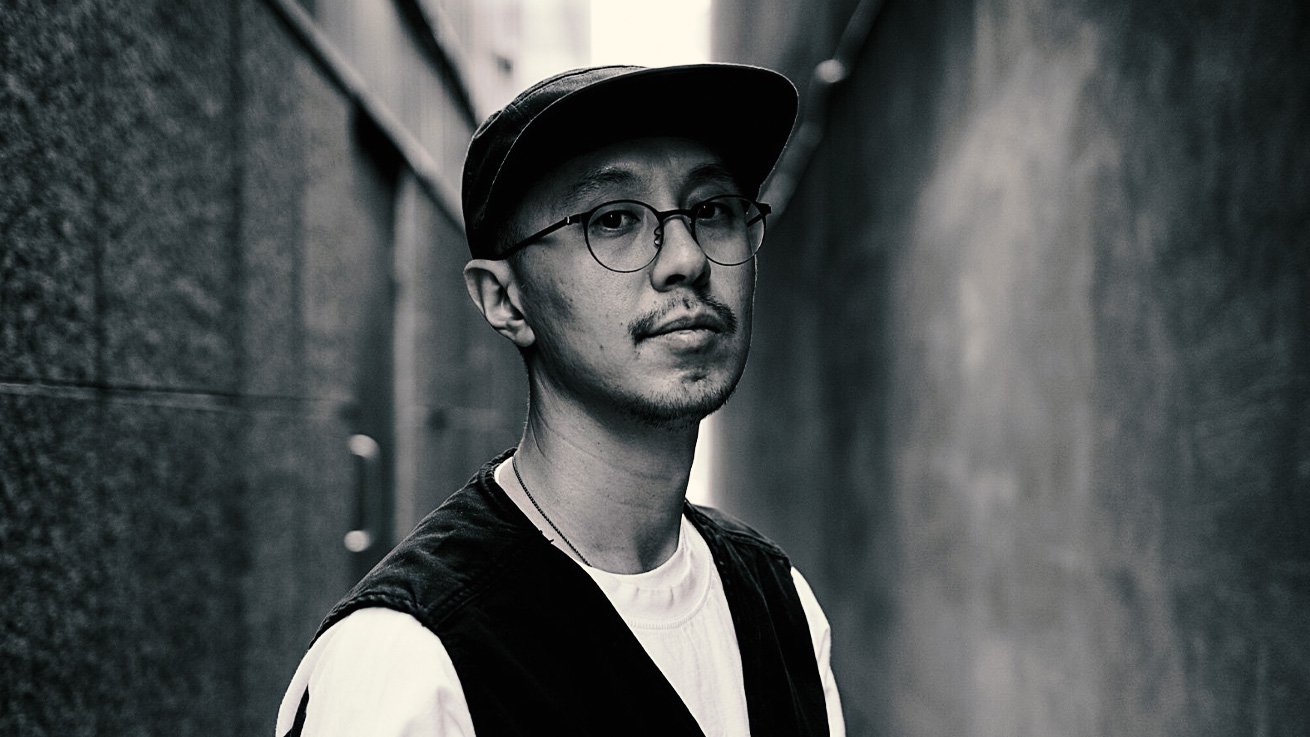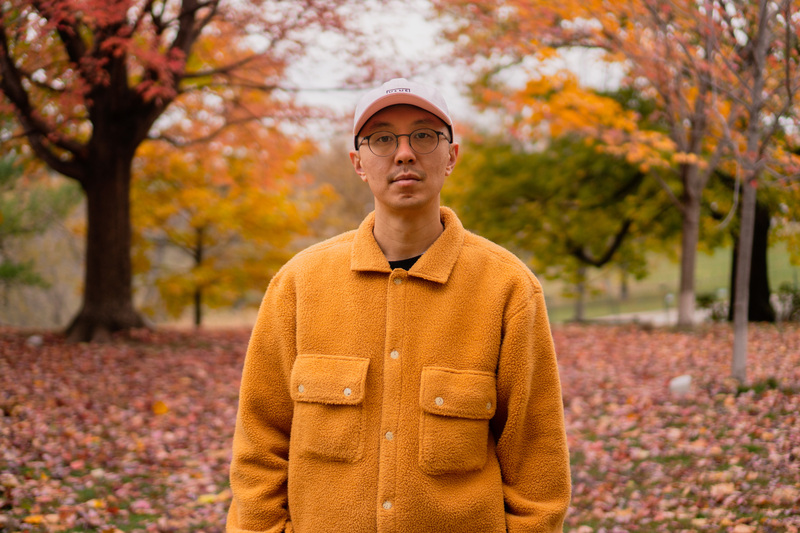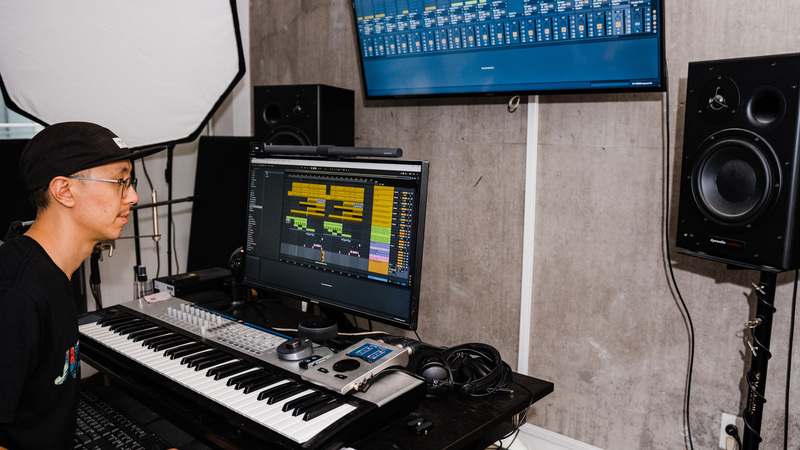Blog
STRANJAH on pre-internet production, and his mission to democratize knowledge
22 Feb '2021
My mission is to help demystify music production and to democratize knowledge. When I started, it was pre-internet, this knowledge wasn't available.

Alan Lam has been producing music in the realms of drum & bass, dubstep, and hip-hop for over 20 years. Releasing under the moniker STRANJAH, the Toronto native has built up a wealth of knowledge over his career and has, over the past few years, made it his mission to democratize this knowledge.
Last year he created the YouTube channel STRANJAH in order to help more people to learn music production. In that time he has built a strong reputation as a trusted and entertaining source of information amassing over 20,000 subscribers and a highly active fan base.
We are living in a golden age of information. Resources such as YouTube allow anyone to access knowledge from industry pros for free, but things weren’t so easy when Lam started producing.
When I started, it was pre-internet. We had what was called bulletin board systems, or BBS. It was like a local version of the internet where you would dial-up with your modem into a landline. There were different BBSs for various interests, the one I joined was called Da Club BBS which was focused around dance music.
“Some people in my city were making electronic music - this pre-internet community was my resource for learning how to make this music. There was information there, there was software. I met people that were making this music and became good friends with them over the years. Some of them, like Fringe, are still active today. That's where I built my foundation.”
Drum and bass, and a lot of the music you're working on, has UK origins. As a Canadian, how did you get into UK dance music?
I got into dance music about 25 years ago. I first got into house music in my teenage years, all the kids around grade nine were starting to rave and one of my friends introduced me to this house music - it was just so foreign to me. All that I was listening to at the time was a lot of commercial dance, we called it eurodance.
I've always been more into electronic-sounding music as opposed to acoustic music, so when I first heard house music the underground sound really intrigued me - it had this really raw edge to it.
At what stage did you begin to make your own music?
I started producing shortly after, so around ‘96 to ‘97. I started producing music with tracker software which was software used to make video game music. Around late ‘96 I learned about drum and bass music. That was when Goldie's ‘Timeless’ album came out and there was a lot of buzz on drum and bass. It was starting to really get popular in America and Canada so I started to hear more of it around.

I was doing more research and learning about different styles of music and came across labels such as Reinforced Records, Metalheadz, and stuff like that. It was so different from house, it was crazy.
At first, I didn't know how to compute it, I didn't understand it. I was actually taken aback by it because it was so intense. After coming back to it, I understood it and I felt Wow, this is really insane music. That's when I decided to switch over and focus on learning how to make jungle and drum and bass music.
What was the process of communicating with labels and submitting demos like in those days?
After starting making music in ‘96, I spent about three years honing my craft and getting really good. Then in ‘99, the internet started to pop up, so I was able to contact labels that way.
I was on the internet searching for labels that released drum and bass. At that time we didn't have Google - we had Alta Vista, and Yahoo. I found one called Flex Records so I emailed them and asked them how I should send a demo over. The label assistant there, DJ Steppa, got back to me and asked me to mail over a CD so I sent one over. Of course, it took about seven or eight days to get over from Canada to the UK so I didn’t hear back from them for a week or two, but they emailed me back and said that they loved my demo and they wanted to work with me. That was how communication worked back then.
Were you building up fan bases both in Canada and the UK at that time? How communal was the international drum and bass scene?
The rave scene in Toronto was around since the early 90s and it actually got very big, so there has always been a connection between the UK and Canada. There was a clear transport of artists from the UK that came over to Canada to play raves over here, so we got exposed to UK music very, very early.
While I was signing music out in the UK, I was building recognition out there. However, we also had platforms here, we had labels out here as well as radio stations where I could get my music played. I was definitely building a foundation in Canada, as well as in the United Kingdom.
You mentioned that when you started making music you were using tracker software, nowadays you use Ableton. How has the technology you personally use to produce changed with time?
Tracker software was very rudimentary. It pretty much allowed you to sample on your computer. I've seen technology progress and evolve so much over the years.
At that time, when I was producing with tracker software I didn't feel it was legitimate, it didn't get the respect that it deserved. Because of this I felt I needed to produce on hardware. After signing to Flex I got an E-MU sampler and an Access Virus B Synth. A lot of my tunes in the early 2000s and late 90s were done on my sampler. That definitely gave me a really deep appreciation for creating sound because in those days, you had to build a sound from the ground up. You didn't have the luxury of all these nice sample packs. I mean, there were sample packs back in the day, but not in the way that they're available today.
![]()
Today it's all done for you, it's nicely packaged. You have your drums, you have your loops, it's all cut for you, everything's curated for you. Back then everything was a lot more raw. You'd have to search for samples, go on the internet and look for samples or make your own samples. It was a very rudimentary approach to producing music, you built music from the ground up.
Today, a lot of software has evolved so that all those processes have been automated for you. You don't have to do all that manual labor to get a filter sweep. It used to be very difficult to get a filter to sweep up, you would have to do it frame by frame using a sampler. Things are definitely a lot easier today.
Newer producers are very fortunate. It'd be interesting for them to be exposed to how it used to be done because it gives you a deeper appreciation for what we have today.
Do you think that one way of doing it is better than the other?
I think we're just in a different time. I wouldn't say one way is better than another, I would say the old way gives you a deeper appreciation for how sound is constructed. However, in today's landscape, because all those things are automated for you, producers can focus on different things in the creative process. I think we're just in a different time and you have to embrace it.
What’s been the biggest or most exciting musical technological development that's happened over your music production career?
I think in general software has just made it easier to make music. It’s gotten a lot better over the years and now you can get a digital sound that almost sounds analog - it's 99% close, even 100% close nowadays.
I think that has been the greatest leap in that you don't need to spend $5,000 on a tube compressor anymore, you can get that same result with a software saturator. All the new software synthesizers are great because you have all these modulation capabilities, that's cool too, but to me, the accessibility of technology is the biggest step forward.
Let’s talk about your YouTube channel, what inspired you to create it?
I have been teaching in person in Toronto for almost 10 years. For me, teaching online and on YouTube has allowed me to take my teaching to the next level. As I mention a lot in my YouTube video, my mission is to help demystify music production and to democratize knowledge so that anyone can access it and succeed in making music. When I started, this knowledge wasn't as accessible, I want to change that and make it accessible to anyone who wants to make music.
Do you see your YouTube video creation process as a creative outlet, or is it more of an education role?
Absolutely, there's definitely a creative approach to it. The filmmaking aspect is very artistic, as you see in the videos it is structured - I try to have something funny in the intro and then to have a bit of education throughout. I'm constantly learning to improve my filmmaking, so I look forward to providing some more interesting formats on my channel in the future.
I really enjoyed your recent vlog on staying mentally healthy in lockdown, do you plan to make more vlog style videos?
Yeah, I definitely want to get more into vlogging. I feel you can only do so much with instructional videos. As an artist I'm not just about making music, there's more to it than techniques and sound design - there's all the human aspect. How do you stay mentally healthy? How do you focus? How do you build healthy habits? I think those things are actually very integral to me as an artist, and play an important process in my development. I definitely want to share more of those soft skills and human aspects of being an artist so that others can benefit.
What are some of the key things you've learned about staying mentally healthy and having good habits? Any key advice that you'd have for people?
When I get in the studio, it's all about getting my mind in the right place first. In my videos I’ve mentioned that meditation plays an integral role in my daily habits. I've been practicing meditation for about 15 years now.
I practice what's called mindfulness which allows you to put your mind in a state where you are focused on the present. Being in that state allows you to put your entire focus on what you're doing in the moment. For example, if I'm making music, my focus is completely there, so that helps in my creative process.

I would also recommend general good habits like eating healthy, exercising, and getting regular sleep. I think you have to be healthy mentally, physically and emotionally to be a functioning artist today. As an artist, you're really a self-employed businessperson, and there are so many different things you have to do on top of making music. You have to be working on your marketing, building relationships, even creating content and graphic design. You have to be on your A-game if you want to be successful and keep on your grind. Having healthy habits will keep you on that trajectory.
Stereotypically dance music and rave culture isn’t the most conducive environment to good mental health.
I was fortunate enough that my interest has always been in the music. I know some people whose relationship to the scene and the music is more about partying. My mind has always been about creating music, however, I do understand that it's possible for an artist or someone in the scene to get lost in that kind of thing. I think you’ve just gotta check yourself and make sure that you're in it for the right reasons, and that you have a healthy relationship with the music.
You're running a YouTube channel and label, you do one on one tutorials, you make music, and much more. How do you keep track of everything that you're doing and make time for each thing? Have you developed a process for that?
I worked for 12 years as a business analyst before I took on teaching and doing YouTube full time. Working in the corporate world, you develop good skills in terms of time management, project management, and creating a roadmap or project plan of how to develop a project. I've taken those skills and put them in my own work. Having a daily or just a monthly plan is important. I use tools to stay on track with my calendar, and I have a list of tasks and goals that I want to achieve each month which I plan out.
When you're making music, how do you continue to push yourself creatively and keep things interesting?
Something that has kept me going throughout these years is to always have a curiosity and thirst to learn. There's always something new to learn and you can never learn it all. That philosophy has kept me engaged since I started making music in the 90s. With every track that I start, there's something there for me to learn.
Something that has kept me going throughout these years is to always have a curiosity and thirst to learn. There's always something new to learn and you can never learn it all.
What were some of the most recent things you've learned or are wanting to learn?
One thing I'm developing more deeply is my music theory. I'd also like to learn more advanced mixing techniques, mixing can be a science and an art of its own. There are various styles of mixing that allow you to create cleaner and louder mixes. I'm also learning more about drum design and synthesizing my own drums.
And what resources do you use nowadays when you're teaching yourself things?
Sometimes it's just experimenting, listening to music that you aspire to and really asking yourself how did they get there? How did they get from A to B knowing what I know and knowing what tools are available?
The first layer is having the perspective and the frame of mind to ask those questions. From there you can experiment and explore. Of course, there are tons of resources today, for example, YouTube. I do watch other YouTube channels as well. I always say that you can't learn it all. Everyone has a different approach, and technique. So the more that you can learn from different people, the better you can become.
You do a lot of Serum tutorials. What would your number one Serum tip be?
I would say just explore. There's so many wavetables in there - explore the different wavetables in the different wavetable positions, and try combining different wavetable positions. Once you've mastered that, then learn about modulating using FM synthesis.
What are some of the most important things you've learned in your time as a YouTuber as opposed to your time as a producer?
Taking on this career as a YouTuber has definitely pushed me to put content out more regularly and consistently. I've learned that having those kinds of structured routines help you to stay creative, so I put a video out every Tuesday and Friday. Having that schedule keeps me active.
Going back to having healthy habits, having routine schedules also helps me stay creative. Sometimes, knowing that you have a deadline pushes you to be creative, sometimes we get bursts of creativity when we know that something has to be done at a certain time.
What long term plans do you have for your YouTube channel?
At the moment, I just want to keep doing what I do, which is democratizing this knowledge and helping people. I'd like to expand and help more people. At this point, the sky's the limit. There are tons of different opportunities where I can look into expanding the channel. I want to have more collaborations and features from other artists. Aside from that, I want to provide more tools to help producers. I'm less than a year in doing YouTube, so there's definitely a lot more to explore. I'm really just learning and experimenting and finding out other ways that I can provide value to my audience.

